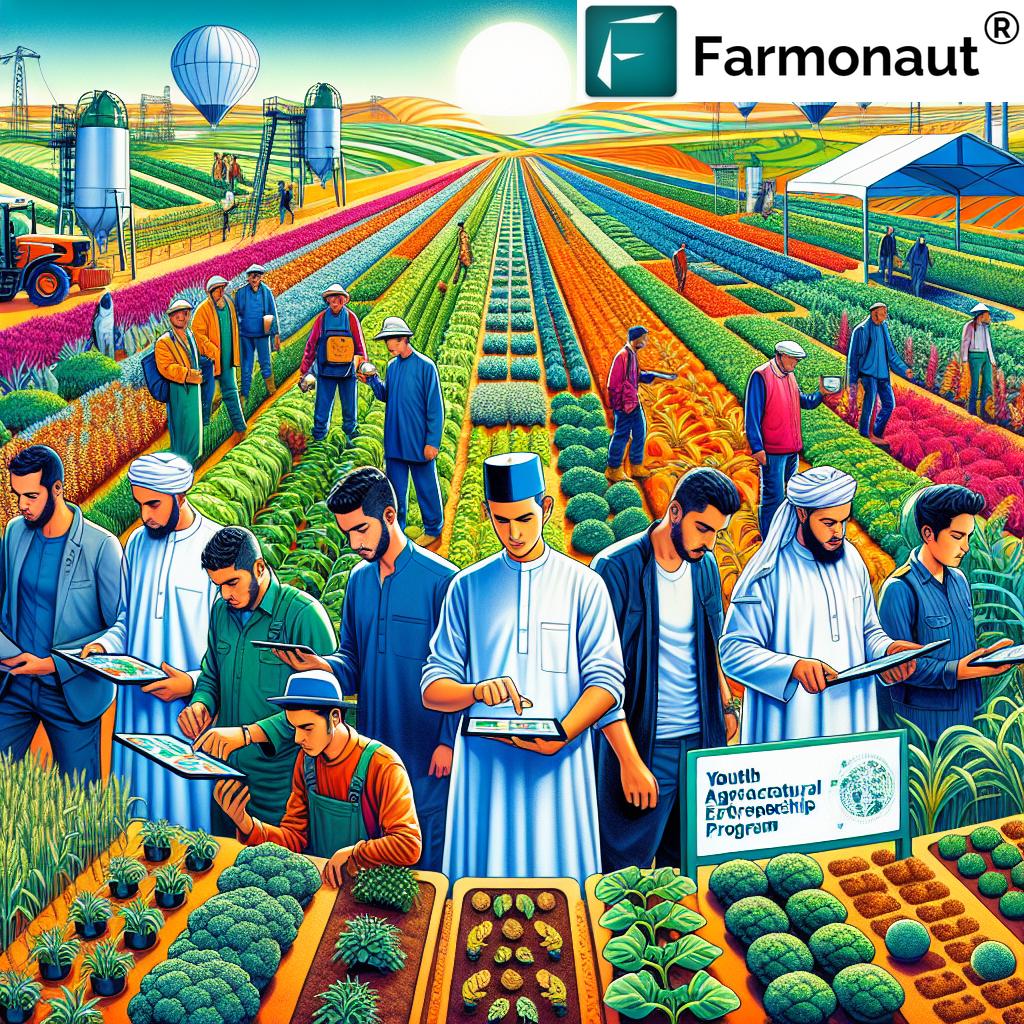South African Fruit Exports Surge: Global Market Trends and Agritech Solutions for 2024
“South African grape exports surged 17% in the 2023/24 season, showcasing remarkable growth in the global fruit market.”
As we delve into the dynamic world of international produce trade, we’re witnessing an exciting era for South African fruit exports. The 2023/24 season has brought unprecedented growth, particularly in the table grape and citrus sectors, positioning South Africa as a formidable player in the global agricultural market. In this comprehensive report, we’ll explore the latest trends, challenges, and innovative solutions shaping the future of fruit exports from the rainbow nation.

The Rise of South African Fruit on the Global Stage
South Africa’s fruit industry has been making waves in international markets, with significant growth observed across various produce categories. Let’s break down the key factors contributing to this surge:
- Table Grape Triumph: The 2023/24 season has seen a remarkable 17% increase in grape exports, showcasing the country’s prowess in viticulture.
- Citrus Sensation: South African citrus production is poised to contribute significantly to global output, which is expected to exceed 100 million tons worldwide.
- Avocado Advancement: With new markets opening up, particularly in China, South African avocados are finding fresh opportunities for growth.
- Diverse Portfolio: From blueberries to apples, the country’s fruit basket is expanding, catering to a wide range of international consumer preferences.
These impressive figures underscore the resilience and adaptability of South Africa’s agricultural sector, which continues to thrive despite global challenges.
Market Analysis: Understanding the Global Fruit Trade Landscape
To fully appreciate South Africa’s position in the global fruit market, it’s crucial to examine the broader international context:
- Asian Appetites: Countries like China, Malaysia, and Vietnam are showing an increasing appetite for premium fruits, creating new export opportunities.
- European Enthusiasm: Traditional markets in Europe remain strong, with a growing demand for organic and sustainably produced fruits.
- American Allure: The United States continues to be a significant importer of South African fruits, particularly citrus and table grapes.
- Middle Eastern Momentum: Countries like the United Arab Emirates are emerging as important hubs for fruit re-export, amplifying South Africa’s reach.
This diverse global demand is driving innovation in production, packaging, and logistics across South Africa’s fruit industry.
Technological Advancements in South African Agriculture
To meet the growing international demand, South African fruit producers are increasingly turning to agritech solutions. Innovative companies like Farmonaut are at the forefront of this agricultural revolution, offering cutting-edge technologies to optimize crop yields and streamline export processes.
Farmonaut’s satellite-based farm management solutions are particularly noteworthy in this context. By leveraging advanced satellite imagery and AI-driven insights, farmers can now monitor crop health in real-time, make data-driven decisions, and improve overall productivity. This level of precision agriculture is crucial for maintaining the high quality standards expected in international markets.
Key technological advancements include:
- Satellite-Based Crop Health Monitoring: Real-time insights into vegetation health and soil moisture levels.
- AI Advisory Systems: Personalized recommendations for crop management and resource allocation.
- Blockchain-Based Traceability: Ensuring transparency and trust in the supply chain from farm to consumer.
- Resource Management Tools: Optimizing water usage, fertilizer application, and pest control measures.
These technologies are not just improving productivity; they’re also addressing critical challenges in agricultural logistics and sustainability.
Explore Farmonaut’s innovative solutions:
Overcoming Agricultural Logistics Challenges
While South African fruit exports are booming, the industry faces significant logistical hurdles. These challenges include:
- Port Congestion: Delays at major ports can impact fruit freshness and market timing.
- Cold Chain Management: Maintaining optimal temperatures throughout the supply chain is crucial for fruit quality.
- Transportation Infrastructure: Improving road and rail networks is essential for efficient produce movement.
- Documentation and Compliance: Navigating complex international trade regulations and phytosanitary requirements.
Innovative solutions, such as Farmonaut’s fleet and resource management tools, are helping to address these challenges. By optimizing vehicle usage and improving overall logistics management, exporters can reduce delays and ensure that South African fruits reach global markets in prime condition.
Spotlight on Key South African Fruit Exports
Let’s take a closer look at some of the star performers in South Africa’s fruit export portfolio:
Table Grapes: A Sweet Success Story
South African table grapes have seen a phenomenal 17% increase in exports for the 2023/24 season. This success can be attributed to:
- Introduction of new, consumer-preferred varieties
- Improved cultivation techniques, including precision irrigation
- Strategic marketing efforts in key markets like China and the UK
Citrus Fruits: Zesting Up Global Markets
With global citrus production expected to exceed 100 million tons, South Africa is playing a significant role. Key developments include:
- Record-breaking lemon exports to markets like the Middle East
- Growing demand for easy-peelers in European markets
- Innovative packaging solutions to extend shelf life
Avocados: Green Gold for South African Farmers
The entry of South African avocados into the Chinese market marks a significant milestone. Other notable trends include:
- Increasing popularity of ready-to-eat avocados in European supermarkets
- Expansion of avocado orchards in new growing regions within South Africa
- Development of value-added avocado products for export
“Global citrus production is expected to exceed 100 million tons, with South Africa playing a significant role in this achievement.”
Sustainable Farming Practices: A Competitive Edge
Sustainability is becoming increasingly important in the global fruit trade. South African producers are adopting various eco-friendly practices to meet international standards and consumer expectations:
- Water Conservation: Implementing drip irrigation and moisture sensors to optimize water usage.
- Integrated Pest Management: Reducing reliance on chemical pesticides through biological control methods.
- Carbon Footprint Reduction: Utilizing solar power and energy-efficient technologies in packing houses and cold storage facilities.
- Biodiversity Preservation: Creating wildlife corridors and protecting natural habitats within fruit-growing regions.
Farmonaut’s technologies play a crucial role in this sustainability drive. Their carbon footprinting feature, for instance, allows agribusinesses to monitor and reduce their environmental impact in real-time.

Food Safety and Quality Assurance in Fruit Exports
Maintaining stringent food safety standards is paramount for success in the international fruit trade. South African exporters are implementing robust quality assurance measures, including:
- GLOBALG.A.P. Certification: Ensuring compliance with internationally recognized good agricultural practices.
- Advanced Traceability Systems: Implementing blockchain technology for end-to-end supply chain transparency.
- Rigorous Pre-Export Inspections: Conducting thorough quality checks to meet phytosanitary requirements of importing countries.
- Continuous Cold Chain Monitoring: Utilizing IoT devices to maintain optimal temperatures throughout the logistics process.
These measures not only ensure compliance with international standards but also build trust with buyers and consumers worldwide.
The Role of Agritech in Optimizing Crop Yields
Agritech solutions are revolutionizing fruit production in South Africa, leading to significant improvements in crop yields and quality. Here’s how technology is making a difference:
- Precision Agriculture: Using satellite imagery and drones for accurate crop monitoring and management.
- Smart Irrigation Systems: Implementing AI-driven irrigation schedules based on real-time soil moisture data.
- Weather Forecasting: Utilizing advanced meteorological data to protect crops from adverse weather conditions.
- Harvest Optimization: Employing predictive analytics to determine the ideal harvest time for maximum fruit quality.
Farmonaut’s platform integrates many of these technologies, providing farmers with a comprehensive tool for modern farm management. Their satellite-based crop health monitoring and AI advisory system are particularly valuable for optimizing yields and quality.
Explore Farmonaut’s API for custom agritech solutions: Farmonaut API
For developers interested in integrating Farmonaut’s technology: API Developer Docs
Emerging Trends in the Global Fruit Market
As we look towards the future of the international produce trade, several trends are shaping the industry:
- Organic and Pesticide-Free Produce: Growing consumer demand for naturally grown fruits.
- Exotic and Tropical Fruits: Increasing popularity of fruits like dragon fruit, durians, and jackfruit in Western markets.
- Convenience Packaging: Rise of ready-to-eat and portion-controlled fruit packaging.
- Functional Fruits: Growing interest in fruits with specific health benefits or nutraceutical properties.
- Direct-to-Consumer Models: Emergence of online platforms connecting fruit producers directly with consumers.
South African fruit exporters are adapting to these trends, diversifying their product offerings and exploring new market opportunities.
Comparative Analysis: South African Fruit Exports
To provide a clear overview of South Africa’s performance in the global fruit market, we’ve compiled a comprehensive comparison table:
| Fruit Type | Estimated Export Volume (tons) | Year-on-Year Growth (%) | Key Export Markets | Notable Trends/Challenges |
|---|---|---|---|---|
| Table Grapes | 750,000 | 17% | EU, UK, China | New variety introductions, extended season |
| Citrus (Lemons) | 600,000 | 10% | Middle East, EU | Record-breaking exports, logistics challenges |
| Citrus (Oranges) | 1,300,000 | 5% | EU, US, China | Increased competition, phytosanitary issues |
| Avocados | 150,000 | 15% | EU, UK, China (new) | Market expansion, value-added products |
| Apples | 500,000 | 8% | Africa, Middle East, Far East | New cultivars, improved storage technology |
| Blueberries | 20,000 | 25% | EU, UK, Asia | Rapid growth, air freight challenges |
This table highlights the diverse range of fruits exported by South Africa and their respective market performances. It’s clear that while traditional exports like grapes and citrus continue to dominate, emerging categories such as avocados and blueberries are showing impressive growth rates.
Challenges and Opportunities in South African Fruit Exports
While the South African fruit export industry is thriving, it also faces several challenges:
- Climate Change: Adapting to changing weather patterns and increased frequency of extreme events.
- Water Scarcity: Managing limited water resources in drought-prone regions.
- Market Access: Navigating complex trade agreements and phytosanitary requirements.
- Labor Issues: Addressing labor shortages and increasing production costs.
- Competition: Staying competitive in a global market with emerging fruit-producing nations.
However, these challenges also present opportunities for innovation and growth. By leveraging advanced technologies and sustainable practices, South African fruit exporters can turn these challenges into competitive advantages.
The Future of South African Fruit Exports: 2024 and Beyond
As we look towards the future, several factors will shape the trajectory of South African fruit exports:
- Market Diversification: Expanding into new markets, particularly in Asia and the Middle East.
- Product Innovation: Developing new varieties and value-added fruit products.
- Technology Adoption: Increasing use of AI, IoT, and blockchain in fruit production and logistics.
- Sustainability Focus: Enhancing eco-friendly practices to meet global consumer expectations.
- Collaborative Efforts: Strengthening partnerships between producers, exporters, and technology providers.
With continued investment in research, technology, and sustainable practices, South Africa is well-positioned to maintain its status as a leading global fruit exporter.
Conclusion: A Fruitful Future for South African Exports
The surge in South African fruit exports is a testament to the country’s agricultural prowess and adaptability. By embracing innovative technologies, sustainable practices, and market-driven strategies, South African fruit producers and exporters are setting new benchmarks in the global produce trade.
As we move into 2024 and beyond, the integration of agritech solutions like those offered by Farmonaut will play a crucial role in addressing challenges and capitalizing on opportunities. From optimizing crop yields to ensuring traceability and sustainability, technology will be the key driver of growth and competitiveness in the international fruit market.
The future looks bright for South African fruit exports, with continued growth expected across various product categories. By staying attuned to global market trends, investing in quality and sustainability, and leveraging cutting-edge agricultural technologies, South Africa is poised to strengthen its position as a world-class fruit exporter in the years to come.
FAQs: South African Fruit Exports and Agritech Solutions
- Q: What are the main fruits exported by South Africa?
A: South Africa’s main fruit exports include table grapes, citrus fruits (oranges, lemons, grapefruits), apples, pears, avocados, and blueberries. - Q: How has technology impacted South African fruit exports?
A: Technology, particularly agritech solutions like Farmonaut’s satellite-based farm management system, has improved crop yields, quality control, and supply chain efficiency, boosting South Africa’s competitiveness in the global market. - Q: What are the biggest challenges facing South African fruit exporters?
A: Major challenges include climate change, water scarcity, logistical issues at ports, compliance with international regulations, and competition from other fruit-producing countries. - Q: How is South Africa addressing sustainability in fruit production?
A: South African producers are adopting water-efficient irrigation systems, integrated pest management, renewable energy in packing facilities, and sustainable packaging solutions to enhance environmental sustainability. - Q: What role does blockchain technology play in fruit exports?
A: Blockchain technology is being used to improve traceability in the supply chain, ensuring food safety, reducing fraud, and building consumer trust in South African fruit exports.




















